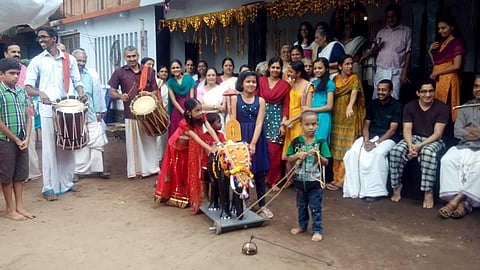

KOCHI: Be it the temples, churches or mosques, places of worship mostly have an adult priest. However, Puthen Kovilakam in Kodungallur has young boys selected from the Kovilam for the role.
Why, you ask? Because here the deity, Kottinchiri Bhagavathy, is partial to children. Another interesting thing about the deity is that her festival coincides with Vishu.
“Vishu-Kottinchiri Bhagavathy festival has many special features,” says Dr K Shivaprasad, a professor at Cusat and founder secretary of the Kodungallur Puthen Kovilakam administration board. He says she is the goddess of children.
“The prayer, Kanathepoyathokeyum Katti Thannidum Ambike, Kuttikalkokeyum Nathe Kottinchiri Namosuthte’, that is said while seeking blessing here endorses the fact. Unlike other temples, the most important offering made here is ‘applause and laughter’. Hence, the name Kottinchiri.”
But if one goes searching for a temple-like structure, then they might not find one. The deity has been enshrined on the patio of the kovilakam. The deity’s story begins around 150 years ago, legends say.
“I think the idol was found in 1874. What happened was that the younger brother of Kodungallur Kunjikuttan Thampuran, Kodungallur Kunjunni Thampuran, who was a child then, had gone to bathe in the Perattakulam inside the kovilakam. While swimming and playing in the water, he found the idol,” says Shivaprasad.
And that started the system of children (young boys aged below 11 years) being appointed the priest and assistant priest.
Explaining the importance of the Vishu festival, 10-year-old Nirupama G Varma, says, “We start the day by bathing in the Perattakulam. Then, we make garlands for Kottinchiri Bhagavathy. The festival flag hoisting takes place two days before Vishu”. The ritualistic bathing of the idol happens on Vishu day, adds Shivaprasad.
Everything associated with the deity is very child-like. The goddess’ thidambu is taken out for procession on a wooden elephant installed on a wooden platform with wheels. “Children will push the elephant. The percussion music is also a family matter,” says Nirupama.
As to the selection of the priests, Deepa Gopikrishnan, Nirupama’s mother says, “The senior-most boy who has turned 10 is selected. The selection also happens from the offspring of the female members of the family. Once the boys have completed their upanayana ceremony (thread ceremony), they become ineligible for the selection”.
On the eve of Equinox, children will perform on a specially constructed stage in the yard. Aksharaslokam, lectures and magic shows by family members will also be performed.
Another interesting tidbit is that the artists who had been disciples of the old Kalari of Puthen Kovilakam will perform the Chakyarkooth and Nangiarkooth, says Shivaprasad. “This year the festival is being held on April 12 (flag hoisting), 13 and 14.”
Though it is a private affair, the shrine is open to outsiders too. “It is said that if one loses anything, it will be found after placing an offering of Rs 2 coin here. The coin offering is to be put inside the hundi only after the prayer is fulfilled,” smiles Shivaprasad.